#Film Production Company in Venice
Explore tagged Tumblr posts
Text
🎥🌟 ORBIS Production: Finest Milan Video Production Agency 🌟🎥
Looking to bring your creative vision to life? Look no further! ORBIS Production, the unrivaled video production agency in Milan, Italy, is here to ignite your brand's storytelling journey with unparalleled expertise and limitless imagination.
🚀 Unleash Tangible Results At ORBIS Production, we believe that every video should make an impact. Our team of skilled professionals is dedicated to producing award-winning video content that not only captures hearts but also delivers measurable results. With a strategic approach and meticulous attention to detail, we ensure your videos resonate with your target audience and achieve significant returns on your investment. Get ready to witness the power of impactful storytelling.
🌐 Elevate Your Brand's Presence In a world where brand recognition is everything, standing out from the crowd is essential. At ORBIS Production, we excel in creating visually stunning and emotionally compelling content that elevates your brand's awareness. Our exceptional video production team goes above and beyond, crafting videos that not only tell your brand's story but also leave a lasting impression on viewers. Prepare to embark on a journey of brand transformation and make your mark in the industry.
🤝 Unparalleled Customer Focus When you choose ORBIS Production - premier Italian production service company headquartered in Milan, you become part of our family. We take immense pride in our customer-centric approach and unwavering commitment to your success. Our experienced team provides exceptional project management, ensuring clear communication, transparent timelines, and regular check-ins. Your vision is our priority, and we're dedicated to bringing it to life with passion and precision.
🎬 A World of Possibilities At ORBIS Production, we offer a diverse range of video content options tailored to your unique needs. From captivating TV commercials and gripping documentaries to thought-provoking branded content and awe-inspiring fashion films, we have the expertise to bring any concept to fruition. Our services extend to promotional videos, impactful testimonials, dynamic sports coverage, mesmerizing motion graphics, compelling non-profit campaigns, and immersive event coverage. Whatever your vision, we're here to turn it into a breathtaking reality.
🌟 Step into the Limelight with ORBIS Production It's time to let your creativity shine on the grand stage of video production. Partner with ORBIS Production, top #1 video production company in Italy, and witness the magic of limitless imagination. Together, we'll create an unforgettable visual masterpiece that not only captivates your audience but also propels your brand to new heights. Don't miss the opportunity to tell your story with brilliance and impact.
📞 Contact us today to discuss your project and embark on a transformative journey of creativity, innovation, and success. The spotlight is waiting for you, and ORBIS Production is here to make your dreams a reality. 🎬✨
Brilliant Video Production Services in Italy provided with the dedication and love to perfection.
#Film Production Company in Italy#Italian Film Production Company#Milan Film Production Company#Film Production Company in Milan#Film Production Company in Venice#Italian Video Production Company#Video Production Company in Italy#Video Production Company in Milan#Video Production Company in Rome#Video Production Company in Turin#Video Production Company in Como#Video Production Company in Bari#Video Production Company in Florence#Video Production Company in Naples#Video Production Company in Amalfi#Video Production Company in Verona#Video Production Company in Genoa#Video Production Company in Siena#Video Production Company in Padua#Video Production Company in Trento#Video Production Company in Bergamo#Italian Production Service Company#Italian Production Service Companies#Production Service Company in Italy#Milan Production Service Company#Production Service Company in Milan#Milano Production Service Company#Italian Video Production Agency#Video Production Agency in Italy#Video Production Agency in Milan
0 notes
Note
I think AYS definitely found its flow post-US trips. Compared to the later trips, you can tell their time in the US really was more spur of the moment, less thought out. I think that's probably why the editing and filming were better in the other places and they had product placement. I wonder if they originally had something else in mind for the content, such as making it just a bangtan bomb kind of like some of the solo adventures we got during chapter 2 (like jungkook's camping vlog), but then they decided to do more trips or pitched it to Disney or something so they put more money and effort into it.
About the behind the scenes content, I do think whatever was kept out of the main episodes was primarily for pacing reasons (despite the fact that I don't think the pacing was super great until Sapporo) and/or some content that was kept for the purpose of making money off the behind the scenes package. Weirdly I don't think bts cares at all about 4th wall breaks. I saw another blog complain about this a while ago, about being able to see staff in the background and ruining the vibe of AYS or messing up the illusion from a production standpoint, but I think bts themselves never try to put up that 4th wall. Obviously the content is supposed to stay focused on them, but the boys have never had a problem talking to their staff on the other side of the camera even during things like run episodes and even in AYS, the last night Sapporo, jikook are sitting around the table drinking and talking with their staff. Beyond what takes focus off the members or respecting that staff aren't public figures, I don't think the members ever care to create that illusion that they aren't filming something or surrounded by staff. I remember reading parts of bts' book and jungkook talks about jikook's trip to japan in 2017 and mentions how the company was worried about their safety if they went and when they arrived in japan, staff was already waiting for them. Even in a private trip that was meant just for the two of them, because of who they are staff were involved and they don't try to hide that.
Also side tangent, but their book was more interesting than I was expecting based on how I'd seen people talk about. A lot of it is summarization of events with bts' thoughts thrown in throughout, but there were some interesting tidbits I didn't know. Like jimin listening to Army sing-along of Young Forever and that's basically what made him come out of a dark place regarding the band's future and contract renewal tensions. Reminded me of Wembley when he cried and said that song had helped him a lot. Also the book and reading things as a timeline really emphasized how much jikook helped each other through that dark period from 2017-2019: the japan trip when they needed to get away from everything, then jimin showing up at a bar for jungkook and them both crying together (the crying together seems to be a theme for them LOL).
Anyway, back to AYS. For the title cards, we can see in Sapporo that they already edited most of the US trip, so the title cards were probably an idea they thought would be good when editing that, but then they didn't really fit as much in the editing of the other trips. Like the Sapporo vibes are just different from jimin's silly little title card recordings.
I really hope we get more AYS when they come out of MS. I expect group activities will be back in full swing, but since they seem to really enjoy traveling together, I think it'd be nice if we got to have future seasons. Its obviously still work, but I do think its on the more enjoyable end of work for them. I want to see them in Montana, US on a ranch riding horses, or in Venice, IT doing a romantic gondola ride, in the Australian outback where jungkook can finally fight a kangaroo.
Hi anon,
You definitely hit on many of the points we'd been discussing here through these posts so it's nice to see I'm not the only one with some of these thoughts.
After seeing the I Am Still documentary though, it's do feel more confident saying that this team's production engine likely gives very little control to their distribution partners. Again, I still need to do an album watchthrough of most of the Disney documentaries but for now, I'd wager that Hybe fully completes their product and then only sells it for distribution. Maybe there's some back-and-forth if there could possibly be any content censorship for brand cohesion but BTS content as a whole is already very low-risk on that front. I'd even go so far to say that the product placement sponsors had more of an impact on the actual end result of the content than Disney did. But that's purely supposition on my part.
Regarding the 4th wall breaks, I don't think i worded my viewpoint very well previously and I don't think i have much better to say here but I'll try. While I agree that BTS's content isn't trying to shy away from the fact that they have staff around them, I do think there are very specific methodologies behind how they've approached it in the past and likely will continue to.
Take Run BTS for example, at the beginning, they attempted to rely for more in on-screen graphics and having the members themselves deliver the necessary exposition. But...I've said this before and I'll say it again, their production actually really sucks at delivering content that needs to be informative. In my opinion, they realized they weren't doing a great job of this and it was a lot more effort to try to mask, when the episodes that they left in a disembodied staff member explaining didn't have any noticeable drop so they decided to just go with including it.
I know i haven't really talked much here about the Run Jin episodes (as I'm likely going to do review posts as well once I'm done with Run BTS) but one of the main things I've been keeping my eye on is how they're compensating for there only being one member. It's seemingly to fall into relying on guest cast and the staff to give Jin the necessary foil, sometimes successfully and other times less-so.
Anyway, back to AYS, it seems to me like they were absolutely still trying to find the line of staff inclusion. Honestly, I wonder if there was a version of the edit where them watching the first cut of episode 1 would have been only included in the bonus content. Without it though, that episode woukd have been much shorter so I think they kept it in the main release purely for time. It fits so well with the overall tone though and I'm so glad they included it.
Again, wondering about the future. I'm sure they will try to revive this show again after military service and I genuinely hope they try to stick to the format of several mini-trips compiled into one 'season'. It will take a skillful team to be sure there's cohesion though. These episodes worked because there is the overarching tjmeline of their solo projects as they prepare for their service that ties the little trips together. I still think my idea of scheduling trips while they're on tour could work but again only if the tour schedule is a little more relaxed than it has been in the past.
It's all theoretical at this point! I would love to see our guys traveling around to some of the less-dazzling destinations as well. I am from a very rural area in the western US and could not even comprehend what it woukd be like for BTS to even be aware of some of those places, let alone actually visit. That was some of the charm of the USA section. They were out in the middle of nowhere seeing just a little bit of Americana. (But I also completely agree with you and want to see a JK / Kangaroo moment as well!)
I'm remembering now another point that I'd wanted to delve into a little more with AYS, which was how they balanced luxury vs the simple life for this show. It's definitely something I noticed shifting over the episodes and I think that had more to do with those sponsorships as well as wanting to give JM and JK some comfortable experiences prior to their enlistment.
Sorry, i went on quite the tangent anon. If I didn't respond to any of the points that you'd like to further discuss, please point them out in another note. I've already rambled far too much for this one!
24 notes
·
View notes
Text
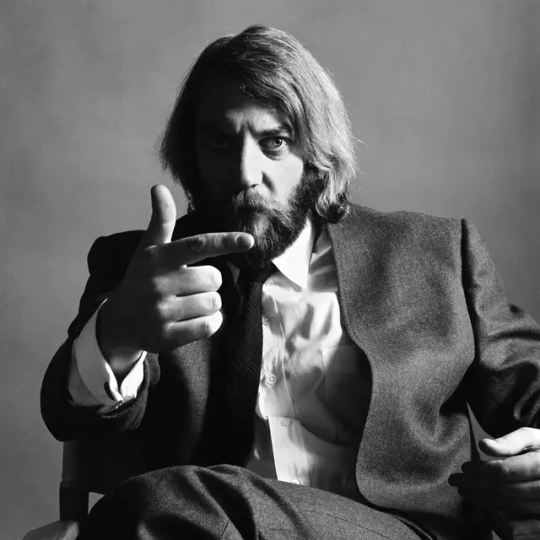
Donald Sutherland
Commanding and versatile actor known for his roles in MAS*H, Don’t Look Now and The Hunger Games
Donald Sutherland, who has died aged 88, brought his disturbing and unconventional presence to bear in scores of films after his breakthrough role of Hawkeye Pierce, the army surgeon in Robert Altman’s M*A*S*H (1970), one of the key American films of its period. It marked Sutherland out as an iconoclastic figure of the 60s generation, but he matured into an actor who made a speciality of portraying taciturn, self-doubting characters. This was best illustrated in his portrayal of the tormented parent of a drowned girl, seeking solace in a wintry Venice, in Nicolas Roeg’s Don’t Look Now (1973), and of the weak, nervous, concerned father of a guilt-ridden teenage boy (Timothy Hutton) in Robert Redford’s Ordinary People (1980).
Although Sutherland appeared in the statutory number of stinkers that are many a film actor’s lot, he was always watchable. His career resembled a man walking a tightrope between undemanding parts in potboilers and those in which he was able to take risks, such as the title role in Federico Fellini’s Casanova (1976).
Curiously, it was Sutherland’s ears that first got him noticed, in Robert Aldrich’s The Dirty Dozen (1967). During the shoot, according to Sutherland, “Clint Walker sticks up his hand and says, ‘Mr Aldrich, as a representative of the Native American people, I don’t think it’s appropriate to do this stupid scene where I have to pretend to be a general.’ Aldrich turns and points to me and says, ‘You with the big ears. You do it’ … It changed my life.” In other words, it led to M*A*S*H and stardom.
Sutherland and his M*A*S*H co-star Elliott Gould tried to get Altman fired from the film because they did not think the director knew what he was doing due to his unorthodox methods. In the early days, Sutherland was known to have confrontations with his directors. “What I was trying to do all the time was to impose my thinking,” he remarked some years later. “Now I contribute. I offer. I don’t put my foot down.”
Sutherland, who was born in Saint John, New Brunswick, Canada, was a sickly child who battled rheumatic fever, hepatitis and polio. He spent most of his teenage years in Nova Scotia where his father, Frederick, ran a local gas, electricity and bus company; his mother, Dorothy (nee McNichol), was a maths teacher. He attended Bridgewater high school, then graduated from Victoria College, part of the University of Toronto, with a double major in engineering and drama. As a result of a highly praised performance in a college production of James Thurber’s and Elliott Nugent’s The Male Animal, he dropped the idea of becoming an engineer and decided to pursue acting.
With this in mind, he left Canada for the UK in 1957 to study at Lamda (the London Academy of Music and Dramatic Art), where he was considered too tall and ungainly to get anywhere. However, he gained a year’s work as a stage actor with the Perth repertory company, and appeared in TV series such as The Saint and The Avengers. He was Fortinbras in a 1964 BBC production of Hamlet, shot at Elsinore castle and starring Christopher Plummer. He also appeared at the Criterion theatre in the West End in The Gimmick in 1962.
In 1959 he married Lois Hardwick; they divorced in 1966. Then he married the film producer Shirley Douglas, with whom he had twins, Kiefer and Rachel; they divorced in 1971. Kiefer, who grew up to become a celebrated actor, was named after the producer-writer Warren Kiefer, who put Sutherland in an Italian-made Gothic horror film, The Castle of the Living Dead (1964). Christopher Lee played a necrophile count, while Sutherland doubled as a dim-witted police sergeant and, in drag and heavy makeup, as a witch.
In an earlier era, the gawky Sutherland might not have achieved the stardom that followed the anarchic M*A*S*H, but Hollywood at the time was open for stars with unconventional looks, and Sutherland was much in demand for eccentric roles throughout the 70s.
He was impressive as a moviemaker with “director’s block” in Paul Mazursky’s messy but interesting Alex in Wonderland (1970), which contains a prescient dream sequence in which his titular character meets Fellini. In the same year, Sutherland played a Catholic priest and the object of Geneviève Bujold’s erotic gaze in Act of the Heart; he was the appropriately named Sergeant Oddball, an anachronistic hippy tank commander, in the second world war action-comedy Kelly’s Heroes; and he and Gene Wilder were two pairs of twins in 18th-century France in the broad comedy Start the Revolution Without Me.
Sutherland was at his most laconic, sometimes verging on the soporific, in the title role of Alan J Pakula’s Klute (1971), as a voyeuristic ex-policeman investigating the disappearance of a friend and getting deeply involved with a prostitute, played by Jane Fonda.
Sutherland and Fonda were teamed up again as a couple of misfits in the caper comedy Steelyard Blues (1973). It initially had a limited distribution due mainly to their participation together in the anti-Vietnam war troop show FTA (Fuck the Army), which Sutherland co-directed, co-scripted and co-produced.
Sutherland always made his political views known, although they surfaced only occasionally in his films. In among the many mainstream comedies and thrillers was Roeg’s supernatural drama Don’t Look Now, in which Sutherland and Julie Christie are superb as a couple grieving their dead daughter. Despite the dark subject matter, the film was notable for containing “one of the sexiest love scenes in film history”, according to Scott Tobias in the Guardian, the frank depiction of their love-making coming “like a desert flower poking through concrete”. The actor so admired Roeg that he named another son after him, one of his three sons with the French-Canadian actor Francine Racette, whom he married in 1972.
John Schlesinger’s rambling version of The Day of the Locust (1975) saw Sutherland as a sexually repressed character – called Homer Simpson – who tramples a woman to death in an act of uncontrolled rage. Perhaps Bernardo Bertolucci had that in mind when he cast Sutherland in 1900 (Novecento, 1976), in which he is a broadly caricatured fascist thug who shows his sadism by smashing a cat’s head against a post and bashing a young boy’s brains out. “And I turned down Deliverance and Straw Dogs because of the violence!” Sutherland recalled.
In Fellini’s Casanova, the second of his two bizarre Italian excursions in 1976, Sutherland coldly calculates seduction under his heavily made-up features. The performance, as remarkably stylised as it is, still reveals the suffering soul within the sex machine.
In 1978 he appeared in Claude Chabrol’s Blood Relatives, a made-in-Canada murder mystery with Sutherland playing a Montreal cop investigating the murder of a young woman. More commercial was The Eagle Has Landed (1976), with Sutherland, attempting an Irish accent, as an IRA member supporting the Germans during the second world war, and as a chilling Nazi in Eye of the Needle (1981). Meanwhile, he was the hero of Invasion of the Body Snatchers (1978), who resists the insidious alien menace until the film’s devastating final shot.
In 1981 Sutherland returned to the stage, as Humbert Humbert in a highly anticipated version of Vladimir Nabokov’s Lolita, adapted by Edward Albee. It turned out to be a huge flop, running only 12 performances on Broadway. Both Sutherland and Albee played the blame game. “The second act is flawed,” Sutherland said. “Albee was supposed to have rethought it, but he never did.” Albee told reporters that he had scuttled some of his best scenes because they were “too difficult” for Sutherland because “he hasn’t been on stage for 17 years”.
Continuing his film career, Sutherland played a complex and sadistic British officer in Hugh Hudson’s Revolution (1985), and in A Dry White Season (1989) he took the role of an Afrikaner schoolteacher beginning to understand the brutal realities of apartheid. In Oliver Stone’s JFK (1991), he held the screen with an extended monologue as he spilled the conspiracy beans to Kevin Costner’s district attorney hero Jim Garrison.
After having made contact with young audiences in the 70s with offbeat appearances in gross-out pictures The Kentucky Fried Movie (1977) and National Lampoon’s Animal House (1978), the latter as a pot-smoking professor, he was cast as an unconvincing bearded stranger in Buffy the Vampire Slayer (1992).
On a more adult level were Six Degrees of Separation (1993), in which he played an unfulfilled art dealer; A Time to Kill (1996), as an alcoholic, disbarred lawyer (alongside Kiefer); Without Limits (1998), as an enthusiastic athletics coach; and Space Cowboys (2000), as an elderly pilot. By this time, he was gradually moving into grey-haired character roles, one of the best being his amiable Mr Bennet in Pride and Prejudice (2005).
The Jane Austen novel was also featured in the television series Great Books (1993-2000), to which Sutherland lent his soothing voice as narrator. Other series in which he shone as quasi baddies were Commander in Chief (2005) – as the sexist Republican speaker of the house opposed to the new president (Geena Davis) – and Dirty Sexy Money (2007-09), in which he played a powerful patriarch of a wealthy family.
Sutherland continued to be active well into his 80s, his long grey hair and beard signifying sagacity, whether as a contract killer in The Mechanic, a Roman hero in The Eagle, a nutty retired poetry professor in Man on the Train (all 2011), or a quirky bounty hunter in the western Dawn Rider (2012), bringing more depth to the characters than they deserved. As President Coriolanus Snow, the autocratic ruler of the dystopian country of Panem in The Hunger Games (2012), Sutherland was discovered by a new generation; he went on to reprise the role in three further films in that franchise, beginning with The Hunger Games: Catching Fire (2013).
He played artists in two art-world thrillers by Italian directors: in Giuseppe Tornatore’s Deception, AKA The Best Offer (2013), he was a would-be painter helping to execute multimillion-dollar scams, while in Giuseppe Capotondi’s The Burnt Orange Heresy (2019) he was on the other side of the heist as a reclusive genius targeted by a wealthy and unscrupulous dealer (Mick Jagger).
Aside from James Gray’s science-fiction drama Ad Astra (also 2019), in which he co-starred with Brad Pitt, Sutherland’s best late work was all for television. In Danny Boyle’s mini-series Trust (2018), which covered the same real-life events as Ridley Scott’s All the Money in the World, he played J Paul Getty, the oil tycoon whose grandson is kidnapped; while in The Undoing (2020), he was the father of a psychologist (Nicole Kidman), reluctantly putting up bail when her husband (Hugh Grant) is arrested for murder.
For the latter role Sutherland was in the running for a Golden Globe, having already received an honorary Oscar in 2017.
He is survived by Francine and his children, Kiefer, Rachel, Rossif, Angus and Roeg, and by four grandchildren.
🔔 Donald McNichol Sutherland, actor; born 17 July 1935; died 20 June 2024
Daily inspiration. Discover more photos at Just for Books…?
50 notes
·
View notes
Text
"Little Women" and Shakespeare
Because I like making lists and finding connection between different things, and because Little Women has become one of my hyperfixations, I thought I'd answer this question:
How many actors from the various filmed versions of Little Women have also performed Shakespeare?
I'm sure this list is incomplete, but it's as comprehensive as I felt able to make it:
Katharine Hepburn (Jo, 1933 film): No Shakespeare roles onscreen, but she played several onstage: Rosalind in As You Like It, Beatrice in Much Ado About Nothing, Portia in The Merchant of Venice, Isabella in Measure for Measure, Katherina in The Taming of the Shrew, Viola in Twelfth Night, and Cleopatra in Antony and Cleopatra.
Edna May Oliver (Aunt March, 1933 film): The Nurse in the 1936 film of Romeo and Juliet with Leslie Howard and Norma Shearer.
Elizabeth Taylor (Amy, 1949 film): Katherina in the 1967 Franco Zeffirelli film of The Taming of the Shrew.
C. Aubrey Smith (Mr. Laurence, 1949 film): Lord Capulet in the 1936 film of Romeo and Juliet with Leslie Howard and Norma Shearer.
Angela Down (Jo, 1970 miniseries): Cordelia in the 1975 BBC King Lear with Michael Hordern, and Helena in the 1981 BBC All's Well That Ends Well.
Stephanie Bidmead (Marmee, 1970 miniseries): Hippolyta in the 1959 NBC A Midsummer Night's Dream and Lady Capulet in the 1967 BBC Romeo and Juliet.
Patrick Troughton (Mr. March, 1970 miniseries): Horatio in the 1947 BBC Hamlet, the Player King in the 1948 Laurence Olivier film of Hamlet, Edmund in the 1948 BBC King Lear, Seyton in the 1949 BBC Macbeth, and Tyrell in the 1955 Laurence Olivier film of Richard III.
Martin Jarvis (John Brooke, 1970 miniseries): Narrator of Shakespeare: The Animated Tales' 1992 adaptation of The Tempest and Leonard (Leonato) in the 2005 ShakespeaReTold adaptation of Much Ado About Nothing.
Logan Ramsey (Mr. Dashwood, 1978 miniseries): The Bishop of Carlisle in the 1982 TV film of Richard II.
Ben Wright (Dr. Bangs, 1978 miniseries): Horatio in the "show within a show" of Hamlet in the 1955 Richard Burton film Prince of Players.
Claire Danes (Beth, 1994 film): Juliet in the 1996 Baz Luhrmann film William Shakespeare's Romeo + Juliet.
Christian Bale (Laurie, 1994 film): Demetrius in the 1999 film of A Midsummer Night's Dream, with Michelle Pfeiffer, Kevin Klein, Stanley Tucci, et al.
John Neville (Mr. Laurence, 1994 film): Valentine in the 1948 TV production Scenes from Twelfth Night and Macbeth, Romeo in the 1957 Producers' Showcase production of Romeo and Juliet, and Henry V in the 1957 Television World Theatre production of Henry V.
Emily Watson (Marmee, 2017 miniseries): Regan in the 2018 TV film of King Lear with Anthony Hopkins.
Angela Lansbury (Aunt March, 2017 miniseries): No Shakespeare roles onscreen, but she did play Gertrude in the National Theatre Company's 1975 production of Hamlet with Albert Finney.
Michael Gambon (Mr. Laurence, 2017 miniseries): Several minor roles in the 1965 film of Othello with Laurence Olivier, Watchman #4 in the 1967 BBC Much Ado About Nothing with Maggie Smith and Robert Stephens, Gregory in the 1967 BBC Romeo and Juliet, and Theseus in the 1971 BBC A Midsummer Night's Dream.
Ian Bohen (Friedrich Bhaer's counterpart "Freddy," 2018 film): Lord Capulet in the high school "show within a show" of Romeo and Juliet in the 1992 sitcom The Torkelsons' episode "Swear Not By the Moon."
Saoirse Ronan (Jo, 2019 film): No Shakespeare roles onscreen yet, but onstage she played Lady Macbeth in the 2021 West End production The Tragedy of Macbeth.
Florence Pugh (Amy, 2019 film): Cordelia in the 2018 TV film of King Lear with Anthony Hopkins. (And, as mentioned, with Emily Watson as Regan – 2017 Marmee and 2019 Amy playing sisters!)
Meryl Streep (Aunt March, 2019 film): No Shakespeare roles onscreen, but she has played a few onstage in the New York Shakespeare Festival: Isabella in the 1976 production of Measure for Measure, Katherina in the 1978 Taming of the Shrew, and Juliet in a one-night 2012 gala reading of Romeo and Juliet with Kevin Kline.
James Norton (John Brooke, 2019 film): No Shakespeare roles onscreen, but onstage he played Posthumus in the Cambridge Arts Theatre's 2007 production of Cymbeline.
Chris Cooper (Mr. Laurence, 2019 film): Antonio in the 2010 film of The Tempest with Helen Mirren.
Jayne Houdyshell (Hannah, 2019 film): The Nurse in the 2013 Broadway production of Romeo and Juliet with Orlando Bloom and Condola Rashad.
@littlewomenpodcast, @fandomsarefamily1966, @thatscarletflycatcher, @ariel-seagull-wings
10 notes
·
View notes
Text
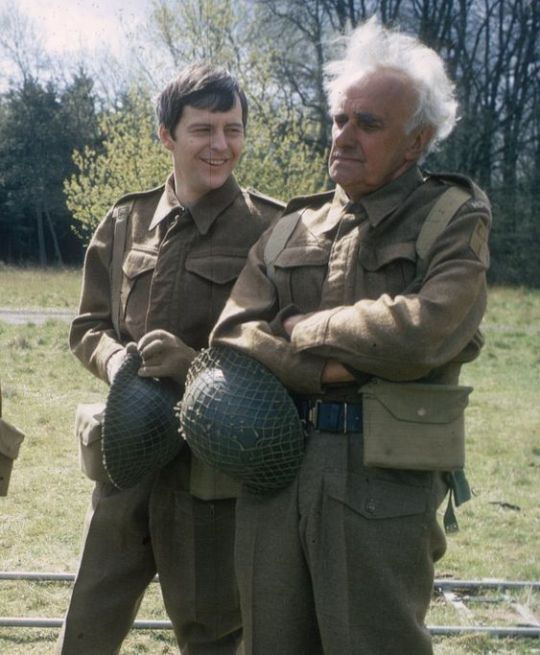
A little more on Ian Lavender, who passed away February 2nd, 2024, aged 77.
Just one of the abiding friendships between the cast of Dad’s Army was between Ian Lavender himself (born 1946) and John Laurie (born 1897).
Private Pike was Ian Lavender’s first ongoing television role, while John Laurie, a Great War veteran, had appeared in British films dating back to 1929, and was a leading Shakespearean actor on stage.
John Laurie was godfather to Ian Lavender’s children, and they were both dab hands at The Times crossword. John Laurie passed away in 1980, at the age of 83.

Ian Lavender always expressed his gratitude for having worked on Dad's Army, but admitted that typecasting had held back his career, particularly in movies, although he did appear in a handful of classic mid-seventies British films, including Carry on Behind, Not Now, Comrade, and Confessions of a Pop Performer.
He reprised his Dad's Army character, Frank Pike, in a BBC radio sequel, It Sticks Out Half a Mile, and he starred alongside Mollie Sugden in one of David Croft's rare catastrophes, the sci-fi sitcom Come Back Mrs Noah. He featured with Jimmy Edwards in The Glums, and had a series of memorable cameos on British television, including in Yes Minister, Goodnight Sweetheart, and Keeping Up Appearances.
According to his obituary in The Guardian:
"...In addition to various live Dad’s Army productions, his stage work included the Peter Hall Company’s The Merchant of Venice, with Dustin Hoffman as Shylock in 1989, touring as the Narrator in The Rocky Horror Show in 2005, Monsignor Howard in the London Palladium production of the musical Sister Act in 2009, The Shawshank Redemption at the Edinburgh fringe in 2013, and his own one-man show of reminiscences, Don’t Tell Him, Pike..."
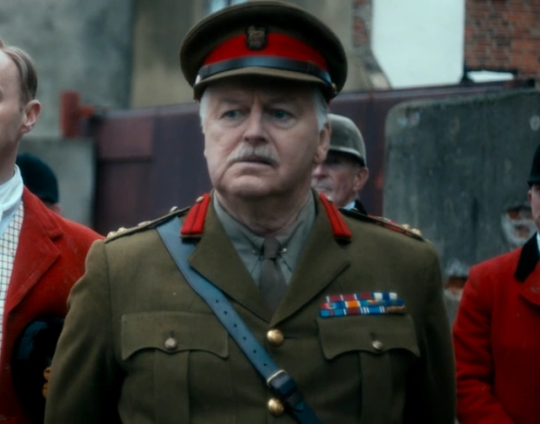
He appeared in 245 episodes of Eastenders, and was one of only two of the original Dad's Army cast members, along with Frank Williams (the Vicar), to appear in the 2016 feature film.
Here Ian Lavender recalls an unintentionally comical appearance on New Zealand radio some years after the final episode of Dad's Army.
#social history#ian lavender#dads army#british culture#british television#british theatre#british actors#classic television#yes minister#keeping up appearances#david croft#bbc radio#eastenders
26 notes
·
View notes
Text


Instagram 16 August 2024


Instagram 27 August 2024

Audio 🎧 from Instagram 9 September 2024
EXCLUSIVE: Apple and Skydance‘s youth empowerment tale Way of the Warrior Kid, based on the 2017 novel by Jocko Willink, has tapped 14-year-old Belfast breakout Jude Hill for its lead role, also bringing on three-time Emmy nominee Linda Cardellini (Dead to Me) for a role.
Hill plays Marc, a self-doubting boy who gets bullied and is hard-pressed to complete a single pull-up, with Cardellini as Marc’s mother, Sarah. As we were first to report, Chris Pratt also stars in the film directed by McG.
In Way of the Warrior Kid, Marc’s uncle, Jake (Pratt), an elite Navy SEAL, is injured on a mission and moves in with his sister for rehab. When he discovers his 13-year-old nephew is struggling academically, socially and physically, Jake takes on a new mission: using his SEAL Team training over three months of summer to help the youth find his inner warrior.
We were first to report on the package out of Cannes, as Pratt and McG came aboard, also sharing word of the $80M-$85M global deal Skydance locked in with Apple, where the company has a first-look deal. The film will be produced by Skydance’s David Ellison, Dana Goldberg and Don Granger, alongside McG and Mary Viola for Wonderland Sound, and Pratt for Indivisible Productions. Additional producers include Ben Everard for Everard Entertainment, and Willink. Will Staples (Without Remorse) adapted the screenplay.
Cardellini is coming off her starring role opposite Christina Applegate on Liz Feldman’s acclaimed dark comedy Dead to Me, which ran for three seasons, bringing her a pair of Emmy nominations, among other accolades. Also a producer on that series, she’s set to reteam with Feldman on No Good Deed, a new dark comedy from Feldman first announced in 2022, which also stars Ray Romano, Lisa Kudrow, and Luke Wilson. Soon, Cardellini will be seen starring opposite Ben Stiller in David Gordon Green’s comedy Nutcrackers, a project we first reported on, which is set to open this year’s Toronto Film Festival. She’s also the female lead opposite Vince Vaughn in Nonnas, Stephen Chbosky’s forthcoming comedy for Fifth Season and 1Community, which we announced.
Hill made his theatrical debut as Buddy, the young lead of Kenneth Branagh’s Academy-Award nominated and BAFTA winning Belfast — a coming-of-age drama examining a boy’s experience coming of age in late ’60s Northern Ireland amid the conflict known as The Troubles. For his performance opposite Judi Dench, Jamie Dornan, Ciaran Hinds, and Caitríona Balfe, he earned numerous awards, including Best Young Actor at the Critics Choice Awards and Best Newcomer at the Hollywood Critics Association Awards. Reteaming with Branagh since then on his Agatha Christie adaptation A Haunting in Venice, Hill will next be seen starring opposite Nicole Kidman, Gael García Bernal and Matthew Macfadyen in Amazon MGM Studios’ thriller Holland, Michigan.
Other upcoming Apple Original Films produced by Skydance Media include genre-bender The Gorge starring Miles Teller and Anya Taylor-Joy; Guy Ritchie’s Fountain of Youth, starring Natalie Portman and John Krasinksi; and the action-adventure film pic May Day with Ryan Reynolds and Kenneth Branagh in the lead.
Cardellini is repped by CAA and Jackoway Austen Tyerman; Hill by Berwick & Kovacik, UTA, and Markham, Froggatt and Irwin.
Deadline 27 August 2024


Instagram 9 February 2023 / Brian’s post
Remember catching up with Wee Jude?
#Tait rhymes with hat#Good times#Happy Birthday Boss 🐶#Holland Michigan#Prime Video#Way of the Warrior Kid#Apple TV#Skydance#Instagram#My screenrecording
7 notes
·
View notes
Text
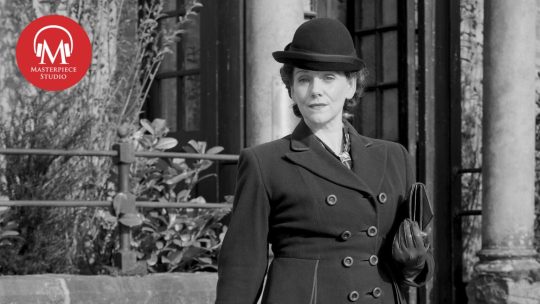
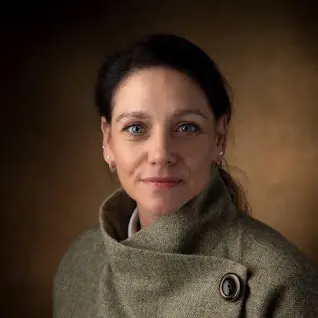
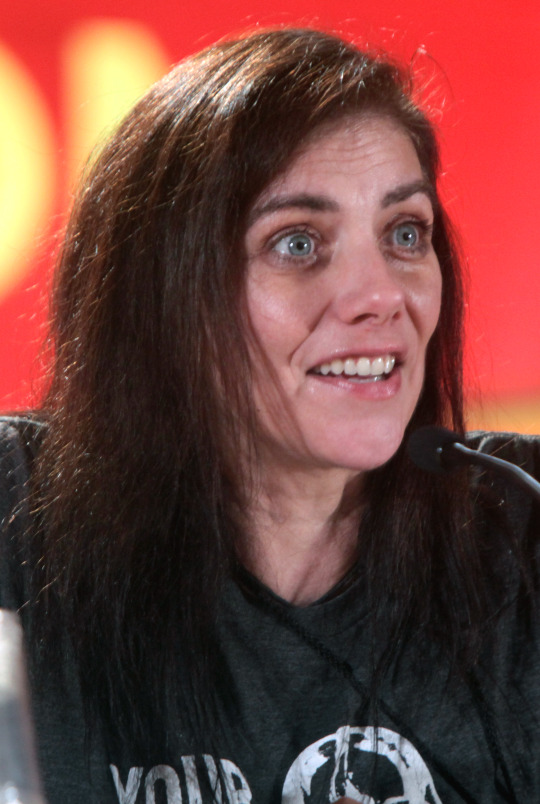
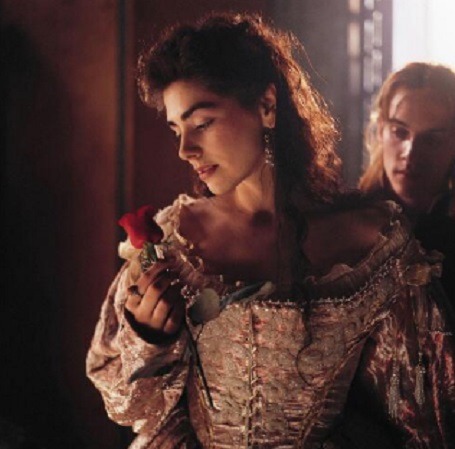
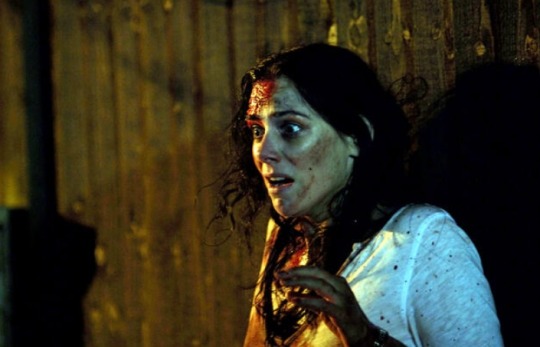
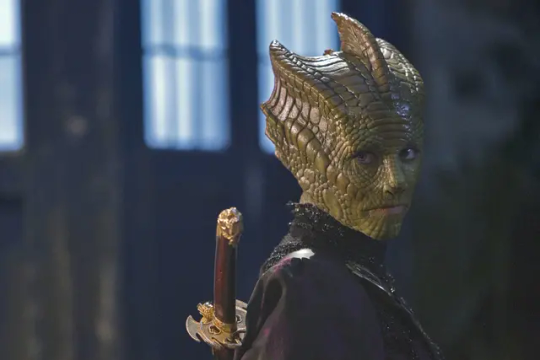
Happy Birthday the Scottish actress Neve McIntosh.
Born as Carol McIntosh on 9th April 1972 in Paisley, McIntosh grew up in Edinburgh, where she attended Boroughmuir High School. She was a member of Edinburgh Youth Theatre in the late 1980s, appearing in Mother Goose and Doctor in the House. She moved to Glasgow to attend the Royal Scottish Academy of Music and Drama, after which she was in repertory companies at Perth and at The Little Theatre on the Isle of Mull.
She next played in a Glasgow stage production of The Trick is to Keep Breathing. She then played in the RSC production of Dickens’ Great Expectations in Stratford, and starred as Portia in Shakespeare’s The Merchant of Venice at the Lyceum in Edinburgh. In summer 2009, she performed in the Sylvia Plath play Three Women at the Edinburgh Festival. Her career coninues on stage both here and in the US.
Neve appeared in American director Mark L. Feinsod’s first film, Love And Lung Cancer. Alongside her many TV appearances, too many to put them all on here without it looking like a shopping list, the ones of note, to me anyway, include the brilliant Psychos, with Dougie Henshall, Trial and Retribution, Dr Who, New Tricks and again with Henshall in Shetland series four. McIntosh also teamed up with two other Doctor’s in an episode of Sky 1’s 10 Minute Tales playing the wife of Peter Capaldi’s character, and alongside David Tennant, in Single Father, a BBC drama. She portrayed the part of Anna, the sister of the dead wife of Tennant’s character.
In 2017, McIntosh played Kay Gillies in the BBC One drama The Replacement she came back home to team up with Martin Compston in Traces and recently put in an appearance in the excellent Tin Star and the podcast series Getting Better - The Fight for the NHS.
Neve's latest role, according to INDB was in the reboot of All Creatures great and Small playing bookkeeper Miss Harbottle
Neve has said that she’s proud to have been consistently acting throughout her career, speaking in The Sunday Post she says, “It’s nice just to be consistently working. There was a time when I had a bit of a wobble, but a lot of acting work had dried up and I think loads of people thought they wouldn’t work again, but it’s building back.
9 notes
·
View notes
Text
I dunno about “we are your savior”, at this point, the studios need the unions to prop up their public perception, which remains in the gutter as public support for the unions is still, months later, overwhelming. If anything, it’s going UP. The latest Gallup Poll puts support among the American public over 70% favoring the writers. But I agree with Diller’s overall sentiment. If AMPTP can’t agree among themselves how to move forward productively in negotiations with the WGA, and SAG-AFTRA after them, then yes, they probably should seriously consider splitting up and making their own deals. After all, it’s working for the non-AMPTP companies, like A24 and Neon, which premiered Ferrari in Venice over the weekend.
And, after a moment from Adam Driver promoting a film that is not part of the AMPTP at the Venice /film Festival:
This is my point! Companies like Neon and A24 are worth a FRACTION of the multi-billion-dollar studios and streamers, yet they can sign the “dream demands” of SAG without hassle and get on with their business, which means it’s not really about the money. If it was, if it was actually true that the studios cannot afford to meet the “dream demands” of the unions, then a smaller company like Neon DEFINITELY wouldn’t be able to. But Neon can! Which means the studios can. They just won’t.
Read more from Sarah Marrs, and keep her words in mind: the studios can. They just won't.
21 notes
·
View notes
Text
November 18, 2023
TOKYO (AP) — Japanese actor-director Takeshi Kitano says he wanted his new film “Kubi” to show the world of samurai in ways that mainstream movies have rarely done before, by portraying the homosexual, love-hate relationship of warlords in one of Japan’s best known historical episodes.
“What is never shown is relationships between men at that time, including their homosexual relationships,” Kitano told a news conference at the Foreign Correspondents’ Club of Japan on Wednesday ahead of the Nov. 23 opening of his film in Japan.
The story of “Kubi,” or “neck,” shows the 1582 ambush of Oda Nobunaga, one of Japan’s best-known warlords, at the Honnoji temple in Kyoto by an aide, Akechi Mitsuhide.
Past dramas from that period have only shown “very cool actors and pretty aspects,” Kitano said.
“This is a period when especially men were keeping up with their lives for other men within these relationships, including sexual relationships,” he said. ”So I wanted to delve into showing these more murky relationships.”
He wrote a script for the idea 30 years ago, then released the novel “Kubi” in 2019, leading to his production of the film. He also plays Toyotomi Hideyoshi, who takes over after Nobunaga, in the film.
Kitano, 76, began his career as stand-up comedian Beat Takeshi before becoming a TV star.
Kitano said he has seen the dark side of the Japanese entertainment industry, which recently has been shaken by a scandal involving the decades-long sexual abuse of hundreds of boys by the late founder of a powerful talent agency. Recently, the suicide of a member of a hugely popular female-only theater company Takarazuka prompted criticism over its alleged overwork and widespread bullying.
“In old days, in the Japanese entertainment industry, I wouldn’t go as far as calling it slavery, but people used to be treated a commodities, from which money is made while showing them off. This is something that’s still left in the culture of Japanese entertainment,” Kitano said.
In his early days as a comedian, there were times when he was paid not even one-tenth of the worth of his work, he said. “There have been improvements in recent years, but I’ve always thought severe circumstances have existed.”
Kitano, who debuted as a film director in 1989 with “Violent Cop” and won the Golden Lion at the Venice Film Festival for “Hana-bi” in 1997, is known for violent depictions in his gangster movies like “Outrage.”
“Kubi,” which refers to traditional beheadings, has ample violence. Violence and comedy are an inseparable part of daily lives, he said.
“Laughter is a devil,” he said. “When people are very serious, such as at weddings or funerals, we always have a comedy or a devil coming in and making people laugh.”
Same for violent films, he said. “Even when we are filming very serious scenes, there are comedic elements that come in on the set, as the devil comes in and makes people laugh,” though those scenes are not in the final version of films.
“Actually, my next film is about comedy within violent films,” Kitano said. It will be a two-part film, with his own violent story followed by its parody version. “I think I can make it work somehow.”
9 notes
·
View notes
Text
John and Yoko and Beatles Docs Headed to Venice
At the Venice Film Festival next month, there are two documentaries premiering that have my attention immediately:
One to One: John & Yoko directed by Kevin Macdonald (The Last King of Scotland) is "a moving look at the couple's life upon their entry into a transformative 1970's New York, exploring their musical, personal, artistic, social, and political world." It's produced by Brad Pitt and his production company. It will feature personal archives from John and Yoko and features remixed concert audio from Sean Ono Lennon.
Things We Said Today from Romanian director Andrei Ujica looks at the band's first North American tour in 1964. Ron Howard's excellent 2016 documentary The Beatles: Eight Days a Week - The Touring Years looked at their touring era from 1962-1966, but this one seems to focus just on that very first tour when Beatle-mania hit the U.S. for the first time.
The link above is the article from Hollywood Reporter.
#the beatles#john lennon#yoko ono#sean lennon#documentary#venice film festival#movie news#film geek#kevin macdonald#brad pitt#andrei ujica
3 notes
·
View notes
Text

La La Land (2016, Damien Chazelle)
08/11/2023
La La Land is a 2016 film written and directed by Damien Chazelle.
The film tells the love story between a jazz musician and an aspiring actress, played respectively by Ryan Gosling and Emma Stone, made a contemporary musical that pays homage to the classic musical films produced between the 1950s and 1960s. The film's title is both a reference to the city of Los Angeles and the meaning of being in the "dream world" or "out of reality". Chazelle wrote the screenplay in 2010, but couldn't find a studio willing to finance the project. Only after the success of his 2014 Whiplash did the project gain interest from production companies.
The film received universal acclaim from critics, who praised Damien Chazelle's direction, Stone's performance and the film's soundtrack, receiving top marks from many critics and proving to be one of the most popular films since its theatrical release.
It was the opening film of the 73rd Venice International Film Festival, where Stone won the Volpi Cup for Best Female Performance. It received 14 nominations for the 2017 Oscars, equaling the record of films such as All About Eve and Titanic, ultimately winning 6 statuettes. It won seven Golden Globes, out of seven nominations, the Audience Award at the Toronto International Film Festival and many other international awards, becoming one of the most awarded and appreciated films of 2016.
On a hot and busy Los Angeles highway, the first meeting takes place between Mia, an aspiring actress who works as a barista at a café in the Warner Bros. Studios, and Sebastian, a jazz pianist who dreams of opening his own place. After yet another failed audition, Mia's roommates, seeing her down in the dumps, convince her to go to a sumptuous party in the Hollywood Hills, at the end of which, walking home, she is attracted by music and enters the club where it comes from.
A few months later, the two meet at a party where Sebastian is playing in an 80s cover band, and it is from that moment that they begin to see each other as friends, despite the strong chemistry between them, discussing their passions and their respective projects for the future. Sebastian invites Mia to the cinema to watch Rebel Without a Cause and she accepts, forgetting a previous commitment she made with her current boyfriend Greg. The two end the evening with a romantic dance at the Griffith Observatory.
Only a few people attend Mia's show. Disappointed and embittered by the negative criticism received and by the lack of Sebastian, Mia decides to leave Los Angeles and her aspirations to return to her parents in Boulder City, Nevada.
Being also a musician, Damien Chazelle has always had a strong predilection for musical films. His vision for the film was to "take an old-fashioned musical, but portray it in real life where things don't always work out", as well as paying homage to all the people who move to Los Angeles to pursue their dreams. Chazelle conceived the idea for the film when he was a student at Harvard University, along with his classmate, Justin Hurwitz. The two explored the concept in their senior thesis through a low-budget musical about a Boston jazz musician called Guy and Madeline on a Park Bench.
#la la land#damien chazelle#jazz#ryan gosling#emma stone#musical theatre#1950s#1960s#los angeles#whiplash#venice film festival#73rd Venice International Film Festival#venice biennale#Volpi Cup for Best Actress#89th Academy Awards#all about eve#titanic#golden globe awards#toronto international film festival#actor#warner bros#pianist#Hollywood Los Angeles#Tribute act#1980s#rebel without a cause#griffith observatory#Boulder City Nevada#nevada#harvard university
10 notes
·
View notes
Text
‘I always play extreme characters’: Zawe Ashton on life after Fresh Meat
As Vod in the hit Channel 4 show she shocked even her own parents. What’s next for the actor-writer-director-producer?

The problem with interviewing someone you feel like you already know is how quickly it can go wrong. One minute you’re saying hello in the empty east London pub you’ve agreed to meet in, spontaneously hugging each other. The next, you’re trying to order a glass of wine and Zawe Ashton is horrified, because it’s not even 5pm yet. She reckons we should have tea instead, so we do. And then she says, “Oh God, I can’t believe I wine-shamed you.”
It is then that I realise Ashton isn’t actually Vod, the student she plays in the Channel 4 student sitcom Fresh Meat. Vod is a literature student who doesn’t read books, preferring partying, shagging and paying her way by selling ecstasy. Ashton, 31, is a straight-A scholar, who spent all her childhood weekends training as an actor, and thus has been earning her own money, appearing on telly in The Demon Headmaster, Jackanory and Desmond’s, since the age of six. Unlike Vod, Ashton has also written a play that’s being developed by the National Theatre; has a book deal for something that sounds like an autobiographical novel, “but I can’t talk about it. Well, not much. Well, I probably will”; and has set up her own production company, Asylum Features, to release films that she writes and directs herself. She is, I have to concede, a bit busy for pubs.
What Ashton does have in common with Vod, however, is that they are both very funny, as becomes apparent when we discuss what it’s like being hailed as “one to watch” and getting nominated for “best newcomer” awards when you’ve already been working for 25 years. “The single perspective shot, Stanley Kubrick, down the corridor,” she says, her mind racing ahead. “Aww, there’s a little girl down there! And then you get closer and she turns round and has the face of” – she puts on a scary voice – “a 200-year-old woman. That is my career right now, in a nutshell. I’m actually at retirement age, internally.” She estimates that she might be due a breakdown. “Or a Macaulay Culkin moment where I just go generally off the rails. Or a Winona Ryder moment, shoplifting.” She thinks about Winona. “How did that happen?”
We head to a quiet room upstairs, where Ashton sprawls across an armchair, all long arms and legs and funny voices, her mind scattering ideas like wildflowers. She recently got back from LA – she bought a plane ticket and left the same day – and found herself getting lured into the new age scene in Venice Beach and Topanga Canyon. “I know it’s the worst word ever,” she says, grimacing, “but I really am transitioning.” Ashton has been to LA several times before, though she won’t say why (you get the feeling there might be various projects in various Hollywood pipelines she can’t yet discuss). This time, she says, a conversation with a guru has left her believing she might be on the cusp of a whole new stage of her life.
Perhaps this transition will liberate her from the anxiety she describes as something of a constant in her life. She was not a carefree child, and even playing Vod, who can be so comically unaware, takes a great deal of awareness. At one point I ask her if it was a relief that the only real sex scenes she’s ever had to do as Vod were more comic than sensual. “A relief?” she repeats, as if I have brought up something as unlikely as Antarctica or a hippopotamus. She is almost breathless. “There’s never any relief! Relief is not a word that ever enters my mind, about anything.”
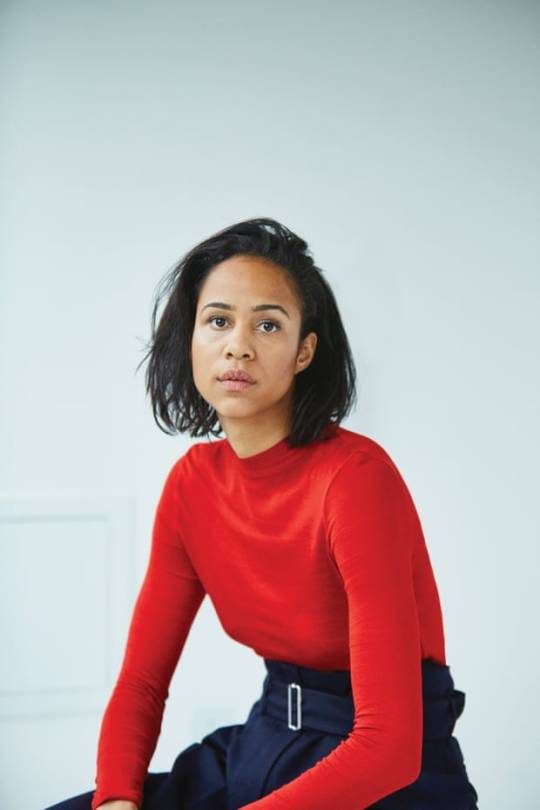
Does she never give herself a break? After all, plenty of people say they want to write a play, a film, a book, but hardly anyone wins the London Poetry Slam Championship in 2000, a Verity Bargate award nomination in 2007 for her debut play, Harm’s Way, or a Raindance film festival nomination in 2014 for best British short for Happy Toys, which she directed. “Well, I think I am like other people. It’s just that I think I’m going to get to the end and then give up. But wow, thank you for saying I finish things, because I really think I am such a scatty person.”
She credits Lena Dunham with showing sex on TV that is not actually sexy, and also with the inspiration for writing, directing and acting in her own shows. “As a woman, you do have a sense that if you can do other things, then you should. If you feel, mmm, the roles are getting a little” – she raises a sardonic eyebrow – “repetitive, and you know you can write, then you should write a different role. It’s a quadruple indemnity mission. I plan on having a long career. I don’t want to burn out. It’s like, I have the shield, and I have the lightsaber” – she is doing movie voices now – “these are my weapons of choice! Hopefully, one of those will come to serve me in some way.”
Does she feel she owes it to the world to redress the balance? “Well, the world doesn’t have to give a shit in any way. It just feels like a fulfilling and smart thing to do.”
Ashton grew up in Stoke Newington, north London, the eldest of three children, and has recently bought her own flat not far from there, living with her boyfriend, a film distributor, whom she prefers not to talk about. Her mother Victoria arrived in England in her teens from Uganda, where Ashton’s grandfather, Paulo Muwanga, had briefly served as both president and prime minister. At a Christmas party, Victoria met her future husband Paul, a working-class cockney who was the first in his family to go to university (Cambridge). The couple both worked as schoolteachers, Victoria teaching design and technology, and Paul teaching English – though he later moved to Channel 4 to commission education programmes for teachers, so telly was always a presence in their house, as well as literature. The three children went to local state schools, and young Zawe was taken to Anna Scher improvisation classes merely to “burn off some energy”. She instantly loved it. “It is very odd to be a very tiny person and know what you want to do.”
Famously, the Anna Scher theatre has produced lots of big names including Kathy Burke and half the cast of EastEnders. But Ashton says it was precisely the unstarry nature of the place that shaped the artist she would become. “It was a weekend drama class that cost £2.50, and we weren’t supposed to do commercials, we weren’t allowed to use the words star or fame – they were banned. You had to say actor or success. You couldn’t say, ‘I want to be a star’ because it was meaningless, just empty calories.”
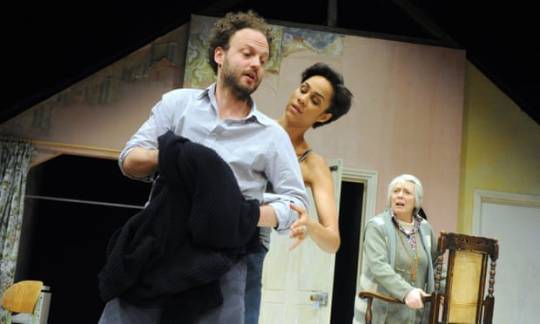
Ashton recounts a story about a black boy being sent home from an audition, having been told that he could never be the Milky Bar kid. Scher, who did the teaching herself, dedicated an entire session to discussing with her pupils where the casting people had done wrong. “We were armed with all of this amazing… activism, I suppose. She’s an amazing woman. You were always encouraged to know why you wanted to act. Politics is not something you think about as a kid, but I realise now that she was infusing us with a level of conscience. You had to be on time, you had to be present. The number of birthdays I missed. I just gave up every Friday night and Saturday afternoon for 14 years.”
It was a dedication that didn’t make her popular with other children at school. Ashton was bullied, and eventually moved secondary school when the threats of beatings from other teenage girls, who knew she was taking days off to film for TV, became too much. At City and Islington College, she found better friends who shared her love of poetry. She took A-levels and applied to do drama at Manchester Metropolitan University.
Then came results day. “I got hurried by my teachers into an antechamber. They were like, ‘Have you opened your results yet?’ I was like, ‘No? Should I? Oh my God, I’ve got three As.’ I was overwhelmed, because it had been a really tough year. My mum had been really ill with cancer. They all said, you have to take a year off to apply to Cambridge now. So there was this crossroads moment – you know, when you realise your life could go in two really different directions? But then the stupid, stupid girl – no, I’m joking. I’m really glad I did what I did.”
What she did was take a year off to look after her mum, and then went to Manchester Met anyway. The course was a bit of a disappointment, she says, the teachers intent on making Ashton less experimental, disparaging her idea to do things such as walk around the audience trailing a red ribbon behind her. (She pitched the same concept at a local experimental theatre a week later and it came second in a commissioning competition.) But she experienced student life, and the partying that she had missed while being such a focused child. She went to Manchester nightclubs and got into DJing, experiences that would prove valuable when she auditioned for Fresh Meat years later.
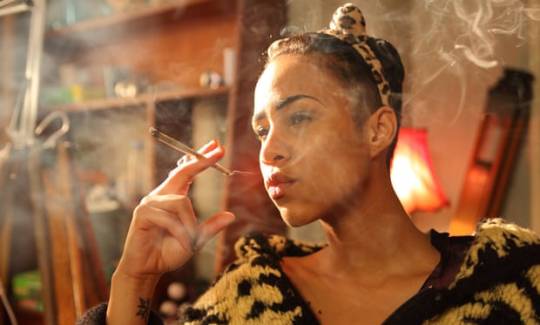
Written by Jesse Armstrong and Sam Bain, the duo behind Peep Show, the show is set in the fictional Manchester Medlock University. Vod is a blunt, libidinous raver; tub-thumping and workshy, with a thudding estuary accent and directional hair. She shares a house with a mismatched group of students – Jack Whitehall, “who makes me laugh so much”, plays the posh twit whose family money has bought the house. In one memorable scene she is made to read Salman Rushdie’s Midnight’s Children and tells the class the book makes her feel “like I’ve got this pompous, fat, naked man sitting on my face, and he’s resting his big, overrated bollocks on my airways”.
Ashton auditioned for the part about eight times, and saw so many other actors there, of every type and look, that she realised she could make Vod her own, that she wasn’t being asked to play any kind of trope. I ask if there has been any negative response to the only black character in the group ending up as a drug dealer. “NEVER!! Oh my God, that’s never something that’s come up,” she says, clearly surprised by the question. “And I feel like, she’s not even as extreme as a ‘dealer’. Vod is someone who capitalises on situations, sometimes ones that are really misguided. It all goes really horribly wrong – I think Vod’s got a lot of obstacles this series. I’m quite excited about watching it.”
She might well be watching it alone, however, or certainly without her dad, who isn’t too keen on seeing her shows. She might have developed her sense of humour from her parents (“They are my favourite comedy double act”), as well as her love of language (“My dad is such a brilliant writer”), but he can’t get used to seeing her on screen. He pretends her shows are radio plays, so he can keep his eyes closed. “Actually, I told my dad he should watch the episode with Vod and her mum, and he said, ‘I’d love to.’ Then he came in and I was right in the middle of saying the c-word. And he was like, ‘Might just go and put the kettle on again.’ ”
She recently played another challenging role in Not Safe For Work, a much bleaker Channel 4 comedy by playwright DC Moore, about the jilted generation of thirtysomethings whose job security has disappeared. Ashton plays Katherine, one of a group of civil servants whose jobs are relocated from London to Northampton following public sector cuts, and who has to maintain a steely professional exterior to hide the way she is falling apart inside. Other roles have included a small part in Doctor Who (for a moment, she was the bookies’ first choice to become the first female Doctor), and the lead in Dreams Of A Life, Carol Morley’s documentary film about Joyce Vincent, the woman whose remains were found on her sofa three years after her death, with the television still on.

“I just always play these really extreme characters – they’ve all come with parental guidance stickers on them. I did this Abi Morgan play at the Donmar just now and she said, ‘You play a lot of outsiders, don’t you?’ And I was like, ‘Oh my God, I do!’” She looks surprised. “And she said, ‘Outsiders who don’t need much male intervention.’ ‘Well, yes, I do,’ I said, like I knew that about myself.”
Other theatre work includes Othello at the Globe and Gone Too Far! at the Royal Court, which is the theatre where she took the young writers’ course and wrote her play For All The Women Who Thought They Were Mad, at 24. It was inspired by research into the way that psychiatric medication affects women, and the way that black women in particular are often over-medicated, so that their health deteriorates even further. “There are stories of women in pretty powerful positions, in jobs, suddenly finding themselves in institutions, unrecognisable to themselves and their friends,” she says. “So I just had to sit in the research and think about it, but there was a writing competition. The night before the deadline, I said to myself, you really owe it to yourself to deliver – just do it. So I sat down and wrote it in an actual fever, staying up for 24 hours.”
Next up is the Genet play The Maids, a double-hander with Emmy-winning American actor Uzo Aduba (best known as Crazy Eyes in Orange Is The New Black), opening in London next month. “It’s going to be really, really interesting to explore two characters who are essentially ready to burst from the beginning of the play.”
After that, perhaps she will have time for a quick personal collapse, though it seems unlikely. “I don’t really have the luxury of having a breakdown,” Ashton says. “I’ve just been working for a really, really long time.” And yet that 200-year-old woman in the corridor has got another century ahead of her, at least.
13 notes
·
View notes
Text
Helen Hayes - First Lady of American Theater
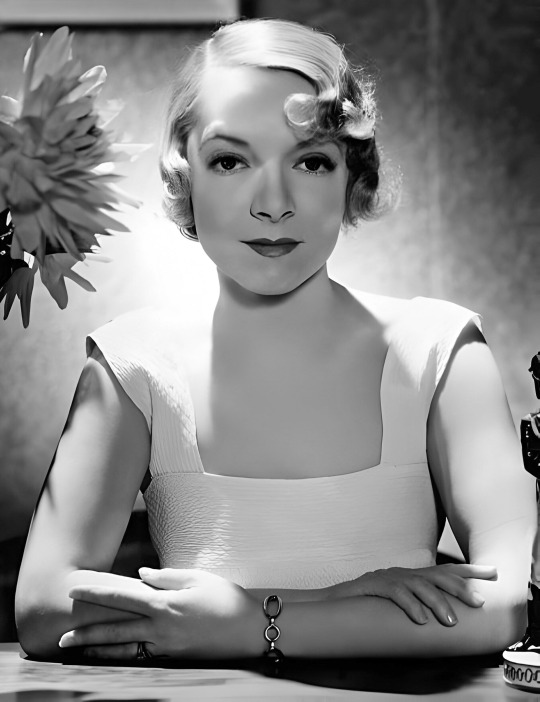
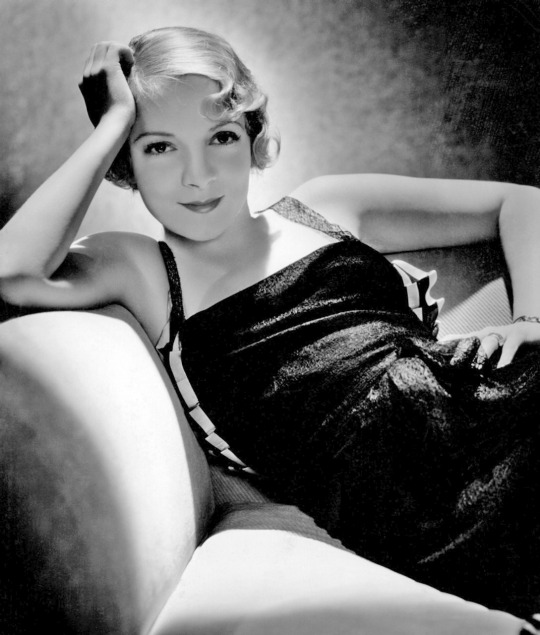


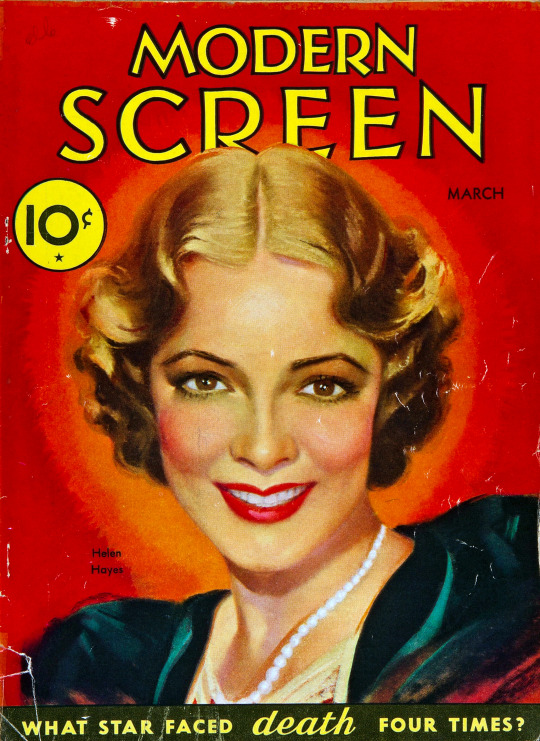
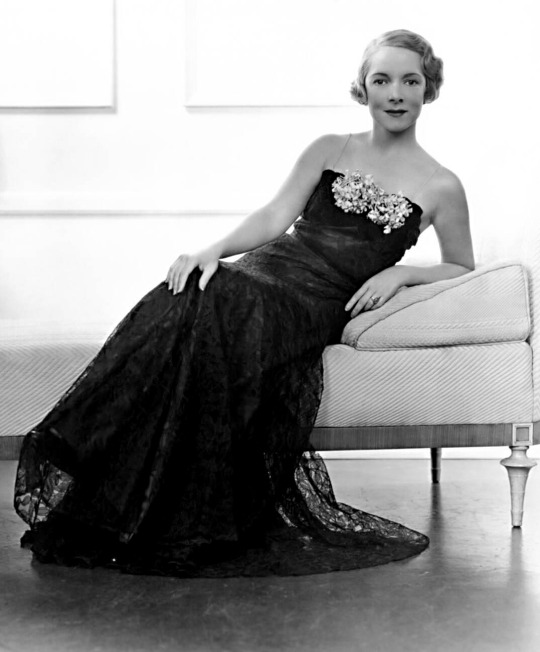

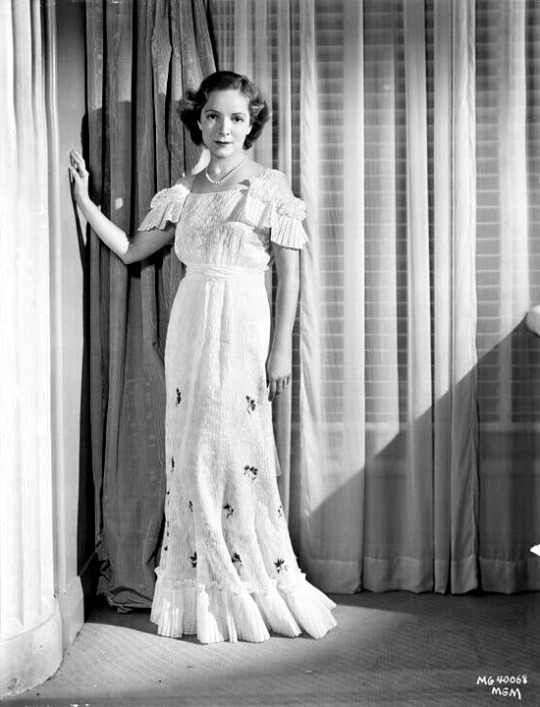
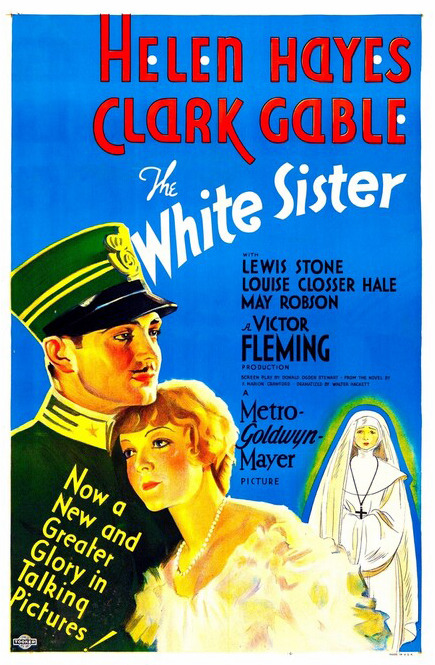

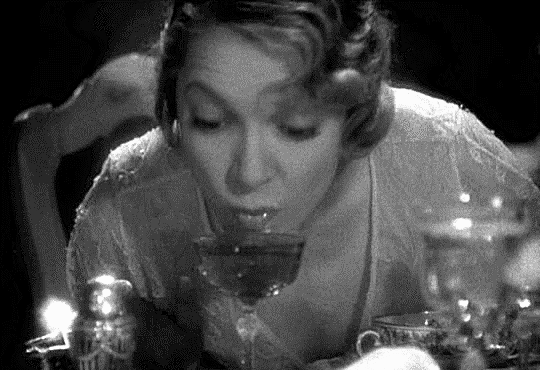

Helen Hayes MacArthur (born in Washington, D.C. on October 10, 1900) was an American actress of Irish, Dutch, and English descent whose career spanned eighty-two years and regarded as the "First Lady of American Theatre."
Hayes made her stage debut at five with her mother's encouragement. At nine, she made her Broadway debut, and a year later, she was cast in the one-reel Vitagraph film.
She moved to Hollywood in 1931 when her husband became a screenwriter for Metro-Goldwyn-Mayer, where she also became a contract player. She made her film debut in The Sin of Madelon Claudet (1932), for which she received an Academy Award. Although she made a number of later films, within four years she returned to Broadway for the greatest success of her career: Gilbert Miller's production of Victoria Regina.
Hayes would return intermittently to Hollywood with featured roles in films, television, and radio, including a film comeback in disaster film Airport (1970), earning her a second Oscar. She retired in 1985 and spent her remaining years in her longtime home of Pretty Penny, in Nyack, New York, where she died of congestive heart failure at 92.
Legacy:
Was the first woman and second person to have won an Emmy, a Grammy, an Oscar, and a Tony Award (an EGOT)
Was also the first person to win the Triple Crown of Acting - the highest awards recognized in American film, television, and theater
Won two Academy Awards: Best Actress for The Sin of Madelon Claudet (1931) and Best Supporting Actress for Airport (1970)
Won the Primetime Emmy Award for Best Actress in 1953 and nominated for for nine more (1951, 1952, 1958, 1959, 1972, 1974, 1976, 1978)
Has three Tony Awards: two for Best Actress in a Play for Happy Birthday (1947) and Time Remembered (1958); and the Lawrence Langer Award for Distinguished Lifetime Achievement in the American Theatre
Won the Grammy Awards for Best Spoken Word Album for Great American Documents (1977) and nominated for the Best Actress in a Motion Picture – Drama for Anastasia (1956) and the Best Actress – Motion Picture Comedy or Musical for Herbie Rides Again (1974)
Selected as Most Favorite Actress at the 1932 Venice International Film Festival for The Sin of Madelon Claudet (1931)
Won the Distinguished Performance Award from the Drama League of New York Awards in 1936
Is one of the original inductees in the American Theatre Hall of Fame in 1972
Received the Golden Plate Award of the American Academy of Achievement in 1972
Inducted into the National Women's Hall of Fame in 1973
Selected as one of 10 artists to be commemorated with the American Arts Commemorative Series gold medallions issued by the Treasury Department in 1980
Was the winner of the 1981 Kennedy Center Honors
Is a founding member of the Board of Advisors of the Riverside Shakespeare Company of New York City in 1981
Co-founded the National Wildflower Research Center in 1982 with Lady Bird Johnson
Won the Award for Greatest Public Service Benefiting the Disadvantaged, given annually by Jefferson Awards, in 1983
Is the namesake for the annual Helen Hayes Awards, which has recognized excellence in professional theatre in Washington, D.C. since 1984
Received the Women's International Center Living Legacy Award in 1985.
Recipient of the Ellis Island Medal of Honor by the Ellis Island Honors Society in 1986
Received the Presidential Medal of Freedom from President Ronald Reagan in 1986
Awarded the National Medal of Arts in 1988
Honored with a US postage stamp in 2011
Has a Broadway theatre named after her: the Helen Hayes Theatre on 44th Street
Served for 49 years on the Board of Visitors for the Helen Hayes Hospital, a physical rehabilitation hospital
Wrote three memoirs: A Gift of Joy, On Reflection: An Autobiography, and My Life in Three Acts
Has two stars on the Hollywood Walk of Fame: 6258 Hollywood Blvd for motion picture and 6549 Hollywood Blvd for radio

#Helen Hayes#First Lady of American Theater#The Sin of Madelon Claudet#Airport#Victoria Regina#Silent Films#Silent Era#Golden Age of Hollywood#Film Classics#Old Hollywood#Vintage Hollywood#Hollywood#Movie Star#Hollywood Walk of Fame#Walk of Fame#Movie Legends#movie stars#1900s#Broadway#28 Hollywood Legends Born in the 1900s
3 notes
·
View notes
Text
'There will be no fresh helpings of The White Lotus, The Last of Us or even Emily in Paris beaming into front rooms when summer fades. Nor will a screen version of the musical Wicked, starring Ariana Grande, be showing in your local cinema in the spring. And all shooting on Gladiator 2 in Morocco is likely to be indefinitely paused. Already, the wails are almost audible.
On this, the first weekend of the American screen actors’ strike, the level of frustration registered by film and TV drama fans around the world has dwarfed earlier reactions to the equivalent writers’ strike, running since the beginning of May.
Since negotiations collapsed in Los Angeles on Thursday, the gloves are off in a fight over the way the streaming services are seen to be pushing down pay and investing in the use of artificial intelligence in production.
And if an industrial relations struggle benefits from a dose of charisma, then the battle to secure the income of the talent behind a large proportion of the world’s streaming content suddenly has much more of the right ingredient. On Friday, George Clooney became the latest celebrity to back the campaign. “Actors and writers in large numbers have lost their ability to make a living,” the actor said, going on to speak of “an inflection point in our industry”.
The recognisability of many of the faces now taking a stand, from Clooney to Margot Robbie and Brian Cox, compared to their counterparts inside the writers’ rooms, has brought the Hollywood dispute to the top of the international news agenda. Productions involving leading American talent, stalled in many countries ever since work on scripts has been prohibited, will now probably grind to a near standstill. And the actors say they are prepared for a long fight.
Among them is Barbie star Robbie, who has stepped out of promotional events, and Oscar winner Susan Sarandon, who argued this weekend that “the issues of streaming and AI are things that have to be dealt with now”. “We’re in an old contract for a new type of business and it’s just not working for most people,” the actor told reporters in New York.
Sarandon’s words follow a protest move in London on Thursday when the stars of the new Christopher Nolan film, Oppenheimer, walked out of the premiere. Emily Blunt, Cillian Murphy and Florence Pugh left with Matt Damon, whose new production company with Ben Affleck is also set to suffer, he said. The cast had the support of the British director Nolan, who has spoken of the moment being ripe for action. Monday’s red carpet event ahead of the New York premiere of Nolan’s film is also cancelled. “In support of the ongoing SAG strike, the film-makers of Oppenheimer will instead screen the movie to celebrate the crew and craftspeople who contributed to making this film,” said a statement from Universal.
Festivals and fan events are threatened too. Organisers of the Toronto International film festival still hope it will go ahead in early September and have told the BBC: “The impact of this strike on the industry and events like ours cannot be denied. We urge our partners and colleagues to resume an open dialogue.” The Venice festival schedulednext month is also in jeopardy, and San Diego’s Comic-Con could be held without its main attraction – celebrities.
On Friday, more than 160,000 members of the Screen Actors Guild-American Federation of Television and Radio Artists (Sag-Aftra) stopped work, joining the 11,500 members of the Writers Guild of America in the biggest strike for more than 60 years. Both writers and actors were negotiating with the Alliance of Motion Picture and Television Producers over residuals, the payments made when a show or film is repeated. Streaming services such as Netflix have large audiences because of their big libraries of films and shows and yet they pay much less in residuals than broadcast television.
Actor Fran Drescher, the serving president of Sag-Aftra known for her role in The Nanny, claims responses from studio and streaming bosses so far have been “insulting and disrespectful”.
Her sentiments have been echoed by Cox, the Scottish actor behind Succession’s ruthless Logan Roy. “If our residuals go down, it means our health insurance isn’t going to be met,” he said on Friday. “The streaming services have shot themselves in the foot because they’ve said, ‘We’re going very well on this front.’ And when we called them to task and said, ‘What about our residuals, what about our money?’ everything kind of closes down and … you know, it’s not going to happen.”
Cox also attacked plans to use AI programming to replicate talent. “There would never be an original voice,” he argued, citing the British writer behind Succession, Jesse Armstrong, and Mike White, the creator and sole writer of The White Lotus. “It would be some kind of copy monkey of the show. And that is unacceptable.”
If screen talent is now playing its part to the full, then the tough-talking industry moguls are also getting into character. On Thursday, ahead of the strike, Walt Disney CEO Bob Iger told CNBC that stoppages had come at “the worst time in the world”. “There’s a level of expectation that they have that is just not realistic, and they are adding to a set of challenges that this business is already facing, that is quite frankly, very disruptive,” he said.'
#The White Lotus#The Last of Us#Emily in Paris#Bob Iger#Wicked#Gladiator 2#Succession#George Clooney#Margot Robbie#Barbie#Brian Cox#Fran Drescher#SAG-AFTRA#Susan Sarandon#Cillian Murphy#Florence Pugh#Emily Blunt#Matt Damon#Robert Downey Jr.#Oppenheimer#Christopher Nolan
3 notes
·
View notes
Note
how come there’s a heap of actors at Venice Film Festival? I thought they weren’t allowed to work including promotion? Are they ALL from studios who have reached a deal with the union?? Confusing.
Most are there with movies produced by smaller, independent studios/production companies which have reached interim agreements with SAG-AFTRA. You'll notice nothing from the big streamers or big studios have been given waivers for actors to promote. Also, there are many European produced films at Venice which were not overseen by SAG-AFTRA during production, so the actors from that are completely free to promote during the film festival.
There are also a lot of fashion allied things going on during the film festival, and many celebs are attending those events. But that has nothing to do with their movies, so they can get press out of that all they want.
6 notes
·
View notes
Note
I’ve said this before and I’ll say this again, when you look at Venice or even the full dwd promo/filming as a whole, Florence was one of the most professional there. Harry, Olivia and Chris were all far more unprofessional than Florence. Olivia and harry are pretty self explanatory, we don’t need to beat a dead horse but let’s not forget that Chris Pine was meant to be doing promo on Fallon (it was one of the talk shows anyway) and pulled out at the last minute after the Venice mess and failed to turn up at any premieres after Venice. I think people forget that big production companies (like Warner Brothers - who was/is financial bother and could only promote 3 movie last year) will want their biggest stars to promote their movies and the fact Florence got out of promo without actually being busy filming something else, is pretty remarkable. They probably came to an agreement that she only done Venice in exchange for her to not speak out again Olivia. There has been multiple rumours that the drama was far worse than reported and it would have ended Olivia’s career if it got out there.
My dad works a lot with WB so I can confirm if they want to pull your ass there, they will. But yeah, in all seriousness idk why people get mad with her whole aperol spritz entrance when it has been announced she won't be attending the presscon. She doesn't need to look somber. She did what she was legally contracted to do. Also when the standing ovation thing became an issue, I remember my dad commenting it's weird because quite a few actors do leave during the standing ovation but what went wrong here is the rest followed suit rather than letting Flo leave quietly.
And even if you put Flo out of the equation, I got secondhand embarrassment from Harry and Olivia separately and together. Harry sounded like a whole dumbass. Those two made it worst by the cold shoulders in the red carpet.
As for Chris Pine, idk why people ignore that the rest of the big cast gave the film the barest minimum they could muster, especially when you see their energy on other film promos. If there's drama with Flo, why is the director the only person giving interviews. Harry is still the lead actor but not one single interview wholly dedicated to promoting the film? How is Flo the sole scapegoat here.
6 notes
·
View notes